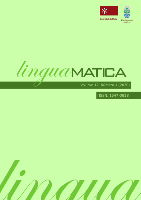
Linguamatica
Scope & Guideline
Fostering Collaboration in Language Research Excellence.
Introduction
Aims and Scopes
- Natural Language Processing (NLP):
The journal publishes research on various NLP techniques, including named entity recognition, text classification, and language modeling, showcasing advancements in machine learning and artificial intelligence applications in linguistics. - Corpus Linguistics and Resource Development:
Linguamatica emphasizes the creation and utilization of linguistic corpora, focusing on their application for research and development of linguistic resources in different languages, such as the development of online platforms for corpus storage and analysis. - Multilingual and Cross-Linguistic Studies:
The journal highlights research that compares linguistic features across multiple languages, including studies on machine translation efficacy and cross-lingual semantic parsing, fostering a better understanding of language structures and their computational representations. - Language Technology Applications:
Research presented in the journal often explores practical applications of language technologies, such as automatic text summarization, style transfer, and dialogue systems, addressing real-world challenges in communication and information processing. - Cultural and Contextual Linguistics:
Linguamatica also engages with the intersection of language and culture, providing insights into how linguistic analysis can inform understanding in specific domains, such as tourism and political discourse.
Trending and Emerging
- Neural Language Models:
Recent publications have increasingly focused on leveraging neural language models for various tasks, indicating a growing interest in deep learning approaches for NLP applications and their effectiveness in language processing. - Political Discourse Analysis:
The examination of language in political contexts, particularly through social media, has gained traction, showcasing the relevance of NLP techniques in analyzing sentiment and argument quality in political communication. - Domain-Specific NLP Applications:
There is a notable increase in research applying NLP to specific domains such as the oil and gas industry and cultural analysis, emphasizing the importance of tailored linguistic resources and technologies for specialized fields. - Character Identification and Analysis in Texts:
Emerging studies on character identification and relationships within narratives indicate a growing interest in the intersection of computational linguistics and literary studies, enhancing understanding of narrative structures. - Automatic Text Summarization and Information Extraction:
Research focusing on automatic summarization techniques and the extraction of information from texts is becoming more prevalent, highlighting the demand for efficient processing of large volumes of textual data.
Declining or Waning
- Historical Linguistics:
Research focusing on historical language evolution, such as the analysis of suffixes in medieval Galician-Portuguese, has become less frequent, possibly indicating a shift towards more contemporary applications of linguistic technology. - Traditional Linguistic Analysis:
Papers emphasizing traditional linguistic methodologies without the integration of computational approaches appear to be declining, as the emphasis on NLP and technological applications grows. - Literary Analysis in Isolation:
Studies that solely focus on literary analysis without a technological or computational component have decreased, reflecting a broader trend towards interdisciplinary approaches that incorporate both literary and computational perspectives.
Similar Journals

Voprosy Yazykoznaniya
Unveiling the Complexities of CommunicationVoprosy Yazykoznaniya, published by the esteemed Russian Academy of Sciences and the State Academy of Humanities (GAUGN), stands as a leading journal in the field of linguistics and language studies. With an impressive Q2 rank in Linguistics and Language for 2023 and a strong position within Scopus rankings, this journal fosters scholarly dialogue and pushes the boundaries of linguistic research by providing a platform for innovative studies, reviews, and analyses. Although not open access, its publication ensures high academic standards and visibility within the global academic community. Researchers, professionals, and students alike can benefit from the rich insights and diverse perspectives presented in this journal, serving as a vital resource for anyone interested in the intricacies of language and its role in society. Operating since 2009 and continuing to 2024, Voprosy Yazykoznaniya is an essential reference point for contemporary linguistic scholarship in the Russian Federation and beyond.
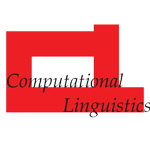
COMPUTATIONAL LINGUISTICS
Unlocking New Frontiers in Language and TechnologyCOMPUTATIONAL LINGUISTICS is a premier academic journal published by MIT Press, focusing on the intersection of linguistics and artificial intelligence. With the ISSN 0891-2017 and the E-ISSN 1530-9312, the journal serves as a key resource for researchers and practitioners in computational linguistics, a field that plays a crucial role in advancing language processing technologies. Since adopting an Open Access model in 2017, the journal has broadened its accessibility, encouraging a global exchange of ideas and research findings. It consistently ranks within the top quartiles of its respective fields, achieving Q1 status in Artificial Intelligence, Computer Science Applications, and Linguistics and Language as of 2023. This notable standing is further reflected in its Scopus rankings, placing it in the 99th percentile for Language and Linguistics, and maintaining a prestigious position in various computer science categories. The journal publishes cutting-edge research, theoretical frameworks, and practical applications, and aims to foster interdisciplinary collaboration among linguists, computer scientists, and AI specialists. As the field evolves, COMPUTATIONAL LINGUISTICS remains an essential platform for disseminating transformative ideas and pioneering work that shapes the future of language and technology.
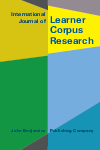
International Journal of Learner Corpus Research
Navigating the Future of Language Acquisition ResearchThe International Journal of Learner Corpus Research (ISSN: 2215-1478, E-ISSN: 2215-1486), published by JOHN BENJAMINS PUBLISHING CO, stands at the forefront of research in the fields of education and linguistics, with a notable impact demonstrated by its Category Quartile rankings of Q2 in Education and Q1 in Linguistics and Language for 2023. This distinguished journal, based in the Netherlands, presents cutting-edge studies that focus on learner corpus research—an area that merges linguistic analysis with practical applications in language learning and teaching. Spanning an impressive convergence period from 2015 to 2024, it has established itself as a vital resource for researchers, educators, and students eager to explore the nuances of language acquisition through empirical data. Notably, its high Scopus rankings underscore its significance within the academic community, making it a must-read for those dedicated to advancing the understanding of learner language dynamics.
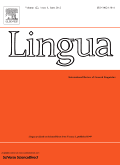
LINGUA
Exploring the depths of language and communication.LINGUA is a premier academic journal dedicated to the field of linguistics, published by ELSEVIER and based in the Netherlands. With an ISSN of 0024-3841 and an E-ISSN of 1872-6135, this esteemed journal has garnered a reputation for excellence, evidenced by its position in the top Q1 quartile in Linguistics and Language as of 2023. LINGUA serves as a vital platform for scholars, researchers, and students, showcasing innovative research and critical discussions across various linguistic subfields. The journal has demonstrated impressive Scopus rankings—151 out of 1088 for Language and Linguistics, and 176 out of 1167 in Social Sciences—placing it in the 86th and 84th percentiles, respectively. By providing a forum for the dissemination of advanced linguistic theories and their applications, LINGUA continues to significantly contribute to the academic community, making it an essential resource for anyone engaged in the study of language.
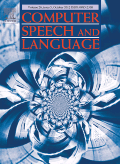
COMPUTER SPEECH AND LANGUAGE
Pioneering Research at the Intersection of Language and TechnologyCOMPUTER SPEECH AND LANGUAGE, published by Academic Press Ltd - Elsevier Science Ltd, stands as a pivotal journal in the fields of Human-Computer Interaction, Software, and Theoretical Computer Science. With an esteemed Q2 ranking in Human-Computer Interaction and top-tier Q1 rankings in both Software and Theoretical Computer Science for 2023, this journal plays a critical role in disseminating innovative research and advancements in computational linguistics and interactive systems. Since its inception in 1986, it has become a sought-after platform for researchers, professionals, and students seeking to deepen their understanding of computer-aided speech processes and language technologies. The journal's comprehensive scope encompasses a wide range of interdisciplinary studies, fostering a collaborative research environment that explores the intersection of technology and human communication.

PROCESAMIENTO DEL LENGUAJE NATURAL
Unveiling the Dynamics of Language and ComputationPROCESAMIENTO DEL LENGUAJE NATURAL, published by the SOCIEDAD ESPAÑOLA DE PROCESAMIENTO DEL LENGUAJE NATURAL (SEPLN), is a premier journal that serves as a vital resource in the interdisciplinary fields of Computer Science and Linguistics. With an impressive 2023 impact factor ranking it as Q2 in Computer Science Applications and Q1 in Linguistics and Language, this journal offers valuable insights into the latest advancements and research trends. Based in Spain, and associated with the University of Alicante, the journal provides a platform for the dissemination of high-quality research, contributing significantly to the understanding of natural language processing and its applications. Although it operates under a traditional subscription model, the accessibility and relevance of its content make it an essential read for researchers, professionals, and students keen on exploring the intersection of language and technology. The journal’s performance, reflected in its Scopus ranks that place it in the top percentiles across various categories, reaffirms its importance in academia and its commitment to fostering innovation and knowledge in the field.

Language and Linguistics Compass
Exploring the Frontiers of Linguistic KnowledgeLanguage and Linguistics Compass, published by Wiley, stands as a premier journal in the field of linguistics, showcasing innovative and interdisciplinary research. With its ISSN 1749-818X and E-ISSN matching, the journal has built a robust reputation, achieving an impressive Q1 ranking within the linguistics category for 2023, placing it in the top 4% of its field. Its Scopus rank of 48 out of 1167 highlights its influence and significance among linguistics journals, boasting a commendable 95th percentile. This journal serves as a vital resource for researchers, professionals, and students, offering a wide range of accessible articles that illuminate current trends and advances within the domain of language studies. Although it is not Open Access, the journal is committed to quality and diversity in its publications, ensuring scholarly articles from various sub-disciplines of linguistics are represented from 2008 through 2024. Located in the United Kingdom, Language and Linguistics Compass invites contributions from around the globe, reinforcing its status as a leading forum for linguistic discourse.

Glottometrics
Elevating Linguistics Through Rigorous Quantitative ResearchGlottometrics is an esteemed academic journal dedicated to the intersection of linguistics and quantitative methods, published by the International Quantitative Linguistics Association (IQLA). Based in Germany, this journal serves as a vital platform for researchers and professionals in the fields of linguistics and applied mathematics, fostering the exploration of quantitative approaches to language studies. With its impact factor reflecting its commitment to high-quality research, Glottometrics has established a robust presence in the academic community, as denoted by its categorization in the Q2 quartile in Linguistics and Language and Q4 in Applied Mathematics. While the journal operates on a subscription-based model, it has made significant strides in the ranking hierarchy, securing positions in the 44th to 48th percentiles across various relevant categories in Scopus. Spanning the years 2017 to 2024, Glottometrics invites contributions that harness innovative quantitative methodologies for linguistics research, making it an essential resource for students, researchers, and professionals engaged in the dynamic analysis of language.

Turkic Languages
Advancing Knowledge of Turkic Language DynamicsTurkic Languages is an esteemed academic journal published by HARRASSOWITZ VERLAG, dedicated to the exploration and analysis of Turkic languages within the broader fields of linguistics and language studies. With an ISSN of 1431-4983, this journal serves as a vital platform for researchers, professionals, and students interested in the intricate structures, dynamics, and cultural contexts of Turkic languages. Although it currently operates without an Open Access option, the journal's commitment to quality research is evident in its placement within the Q4 category of Linguistics and Language for 2023, alongside its Scopus rankings where it stands in the 30th and 26th percentiles for Language and Linguistics across Arts and Humanities and Social Sciences, respectively. The journal's scope encompasses a variety of linguistic phenomena, striving to foster a deeper understanding of Turkic languages and their significance in the global linguistic landscape. With converged years from 2017 to 2022, Turkic Languages continues to uphold its reputation as a crucial resource for advancing scholarship in this specialized field.

RUSSIAN LINGUISTICS
Advancing the frontiers of Russian language studies.RUSSIAN LINGUISTICS is a peer-reviewed academic journal published by Springer, dedicated to advancing the understanding of the Russian language and its interplay with various linguistic frameworks. With a longstanding history that spans from its inception in 1974, the journal encompasses a broad range of topics within the fields of linguistics and language studies, offering valuable insights especially in *Developmental and Educational Psychology* and the intricacies of linguistics at large. Currently ranked in the Q2 quartile for Linguistics and Language, and holding substantial positions within Scopus rankings, RUSSIAN LINGUISTICS serves as an essential resource for researchers, educators, and students alike, fostering dialogue and collaboration within the international linguistic community. The journal notably provides critical access to research findings that enhance the comprehension of Russian linguistics' role in a global context, despite operating under a traditional access model. For those pursuing scholarly excellence, RUSSIAN LINGUISTICS remains a pivotal platform for disseminating innovative research and promoting the study of language.